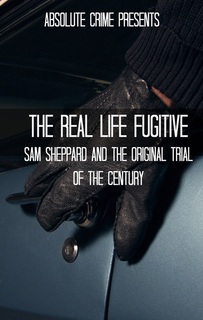The Real Life Fugitive: Sam Sheppard and the Original Trial of the Century

The crime was unthinkable: a respected doctor is convicted of brutally murdering his pregnant wife. The trial that followed was a media circus--one often compared to the O.J. Simpson trial. The popularity of the case would go on to be one of the alleged inspirations of the TV show "The Fugitive" (and later the Harrison Ford movie of the same name)—something the creators deny, but fans insist is true.
This book proves that truth is always more interesting than fiction. It looks at the murder, the suspects, and the ultimate outcome of one of the most notorious murders of all time.
This book proves that truth is always more interesting than fiction. It looks at the murder, the suspects, and the ultimate outcome of one of the most notorious murders of all time.
Buy Now!
The Real Life Fugitive PDF and ePub |
Excerpt
Introduction
Moonlight shone across Lake Erie as Dr. Sheppard and his wife, Marilyn, jumped from their motorboat into the cool, dark water. Waterskiing after midnight sounded like a refreshing way to end the mid-summer evening by their lakeside home in Bay Village, Ohio.
The heat of the day had dissipated, and the sun’s fiery orb had long since melted into the horizon, gearing up for a beautiful Fourth of July weekend. A warm breeze rippled the water, water that sometimes churned up violent waves without warning, while at other times stilling into a shimmering sheet of glass.
A friend and neighbor sat at the controls, waiting for the couple to slip on their skis and give him the go-ahead. Dr. Sheppard, or Dr. Sam as most people called him, got his skis on first, but he didn’t have to wait long for his athletic wife.
“Okay, I’m ready,” Marilyn called to him, treading water a few feet away. He wasted no time waving his arm in a wide arc, signaling to the driver.
The couple could hear the duel outboards rev and could feel the power pulling them through the water, slowly at first and then faster and faster. They gripped their tow bars, bending at the knees, letting the speed bring them to the surface until they were both upright, skiing side-by-side across the deserted lake.
Marilyn wore a modest one-piece bathing suit that flattered her slender figure. Thirty-one years old and four months along in her second pregnancy, she still looked as fit as the day she’d graduated from high school. She had her thick brunette hair tucked up in a white bathing cap, customary for women of the 1950s. Balancing easily behind the aluminum boat, she enjoyed the freedom of waterskiing and the spray of the water splashing against her bare skin.
The houses along the shore blurred past them as the couple flew around the lake with abandon. They couldn’t help smiling in the fast-moving shadows, thrilled as the boat pulled them into the darkness. Pretty soon the houselights dimmed behind them as they flew further and further from shore—in a lake so enormous that Marilyn sometimes felt as if she could get lost at sea forever. She glanced at her husband, skiing expertly alongside her, and felt reassured. Still, anything could happen at that speed, at that hour, where the watery darkness obscured visibility, making it impossible to see what was waiting ahead—and what waited ahead was a brutal and bloody murder. Marilyn Sheppard had only a few days left to live.
On July 3, 1954, Marilyn woke to the sound of water lapping against the shore beneath her open, upper-story bedroom window. A semi-private beach stretched out below the bluff upon which their house stood, and the soothing sound of waves rose like music through the mature maple trees that shaded their white, cape-cod-style home. A burst of light reached in the dormer window through a partially upraised shade, as the sun rose lazily, spreading itself over the suburban rooftops in the upscale neighborhood.
Marilyn tilted her head and listened for her seven-year-old son, Chip, who lay in the next room, but she didn’t hear anything. He’s still sleeping, she decided, remembering that he’d stayed up late the night before. They named him Sam after his father but called him Chip so as not to get the two mixed up.
Next, she listened for any sign of their houseguest, Dr. Lester Hoversten, an associate of Sam’s from medical school. Hoversten had recently taken up residence in their master bedroom, since Marilyn preferred the guest room during the summer months, because it faced the lake. Hoversten, a night owl, usually slept until noon, which was just as well. The man gave Marilyn the creeps. Sometimes it felt as if Sam put Lester’s needs above hers. Sure, Lester could use a place to stay while he looked for work, but he didn’t have to leave his clothes lying around, and he could have better manners over all. No wonder his wife kicked him out, she mused, not to mention the hospital that recently fired him. She resented his presence, and he knew it. She also resented a past sexual innuendo he’d thrown her way. “Thank goodness he’s staying elsewhere tonight,” she said under her breath as she pushed the white bedspread aside. She and Sam had invited their neighbors, the Aherns, over for dinner, and she looked forward to Lester leaving.
She slid her legs over the edge of the bed and contemplated the long day ahead. She should be waking eagerly on a holiday weekend but felt a bit overwhelmed. She had a lot to do to prepare for the Fourth of July. Sam had volunteered to entertain a large group of interns and their significant others at a cookout the following day. He hadn’t discussed it with her before offering to host the event. Didn’t she have any say in the matter? She was pregnant after all, had he forgotten? Her husband had brushed her mood off, and didn’t understand why she had blown things out of proportion.
Earlier that morning, Dr. Sam had slipped quietly through the kitchen and stepped into the garage where he’d parked his Lincoln the previous evening. His medical profession provided the best of everything: a dream house with a money view, a Lincoln, a Jaguar, a boathouse, and the thirteen-foot motorboat he’d purchased with the Houks, who lived a few doors down.
After backing out of the driveway, he drove a mere mile down the road to Bay Village Hospital, a mid-nineteenth-century stone mansion now owned by the Sheppard clan. The hospital had a pitched roof of fish-scale tile and numerous gables rising along its upper stories. Turrets, with conical spires, reached nobly to the sky only outdone in height by numerous brick chimneys. Three stories below, a row of Roman arches stood like sentinels atop the stone steps. The place exuded wealth, and so did the Sheppards.
Sam and his brothers, Drs. Steve and Richard, as well as their father, worked at Bay Village, having built it into a thriving practice. Even on a holiday weekend, the three brothers—all osteopathic physicians like their dad—attended to patients well into the afternoon. Recently, the foursome had posed for a picture, had stood there, father and sons, feeling as if they were on the top of the world. Little did they know that tragedy would soon strike, and all their hard work and success—even their reputations—would flounder like a four-masted ship in a storm.
Moonlight shone across Lake Erie as Dr. Sheppard and his wife, Marilyn, jumped from their motorboat into the cool, dark water. Waterskiing after midnight sounded like a refreshing way to end the mid-summer evening by their lakeside home in Bay Village, Ohio.
The heat of the day had dissipated, and the sun’s fiery orb had long since melted into the horizon, gearing up for a beautiful Fourth of July weekend. A warm breeze rippled the water, water that sometimes churned up violent waves without warning, while at other times stilling into a shimmering sheet of glass.
A friend and neighbor sat at the controls, waiting for the couple to slip on their skis and give him the go-ahead. Dr. Sheppard, or Dr. Sam as most people called him, got his skis on first, but he didn’t have to wait long for his athletic wife.
“Okay, I’m ready,” Marilyn called to him, treading water a few feet away. He wasted no time waving his arm in a wide arc, signaling to the driver.
The couple could hear the duel outboards rev and could feel the power pulling them through the water, slowly at first and then faster and faster. They gripped their tow bars, bending at the knees, letting the speed bring them to the surface until they were both upright, skiing side-by-side across the deserted lake.
Marilyn wore a modest one-piece bathing suit that flattered her slender figure. Thirty-one years old and four months along in her second pregnancy, she still looked as fit as the day she’d graduated from high school. She had her thick brunette hair tucked up in a white bathing cap, customary for women of the 1950s. Balancing easily behind the aluminum boat, she enjoyed the freedom of waterskiing and the spray of the water splashing against her bare skin.
The houses along the shore blurred past them as the couple flew around the lake with abandon. They couldn’t help smiling in the fast-moving shadows, thrilled as the boat pulled them into the darkness. Pretty soon the houselights dimmed behind them as they flew further and further from shore—in a lake so enormous that Marilyn sometimes felt as if she could get lost at sea forever. She glanced at her husband, skiing expertly alongside her, and felt reassured. Still, anything could happen at that speed, at that hour, where the watery darkness obscured visibility, making it impossible to see what was waiting ahead—and what waited ahead was a brutal and bloody murder. Marilyn Sheppard had only a few days left to live.
On July 3, 1954, Marilyn woke to the sound of water lapping against the shore beneath her open, upper-story bedroom window. A semi-private beach stretched out below the bluff upon which their house stood, and the soothing sound of waves rose like music through the mature maple trees that shaded their white, cape-cod-style home. A burst of light reached in the dormer window through a partially upraised shade, as the sun rose lazily, spreading itself over the suburban rooftops in the upscale neighborhood.
Marilyn tilted her head and listened for her seven-year-old son, Chip, who lay in the next room, but she didn’t hear anything. He’s still sleeping, she decided, remembering that he’d stayed up late the night before. They named him Sam after his father but called him Chip so as not to get the two mixed up.
Next, she listened for any sign of their houseguest, Dr. Lester Hoversten, an associate of Sam’s from medical school. Hoversten had recently taken up residence in their master bedroom, since Marilyn preferred the guest room during the summer months, because it faced the lake. Hoversten, a night owl, usually slept until noon, which was just as well. The man gave Marilyn the creeps. Sometimes it felt as if Sam put Lester’s needs above hers. Sure, Lester could use a place to stay while he looked for work, but he didn’t have to leave his clothes lying around, and he could have better manners over all. No wonder his wife kicked him out, she mused, not to mention the hospital that recently fired him. She resented his presence, and he knew it. She also resented a past sexual innuendo he’d thrown her way. “Thank goodness he’s staying elsewhere tonight,” she said under her breath as she pushed the white bedspread aside. She and Sam had invited their neighbors, the Aherns, over for dinner, and she looked forward to Lester leaving.
She slid her legs over the edge of the bed and contemplated the long day ahead. She should be waking eagerly on a holiday weekend but felt a bit overwhelmed. She had a lot to do to prepare for the Fourth of July. Sam had volunteered to entertain a large group of interns and their significant others at a cookout the following day. He hadn’t discussed it with her before offering to host the event. Didn’t she have any say in the matter? She was pregnant after all, had he forgotten? Her husband had brushed her mood off, and didn’t understand why she had blown things out of proportion.
Earlier that morning, Dr. Sam had slipped quietly through the kitchen and stepped into the garage where he’d parked his Lincoln the previous evening. His medical profession provided the best of everything: a dream house with a money view, a Lincoln, a Jaguar, a boathouse, and the thirteen-foot motorboat he’d purchased with the Houks, who lived a few doors down.
After backing out of the driveway, he drove a mere mile down the road to Bay Village Hospital, a mid-nineteenth-century stone mansion now owned by the Sheppard clan. The hospital had a pitched roof of fish-scale tile and numerous gables rising along its upper stories. Turrets, with conical spires, reached nobly to the sky only outdone in height by numerous brick chimneys. Three stories below, a row of Roman arches stood like sentinels atop the stone steps. The place exuded wealth, and so did the Sheppards.
Sam and his brothers, Drs. Steve and Richard, as well as their father, worked at Bay Village, having built it into a thriving practice. Even on a holiday weekend, the three brothers—all osteopathic physicians like their dad—attended to patients well into the afternoon. Recently, the foursome had posed for a picture, had stood there, father and sons, feeling as if they were on the top of the world. Little did they know that tragedy would soon strike, and all their hard work and success—even their reputations—would flounder like a four-masted ship in a storm.








